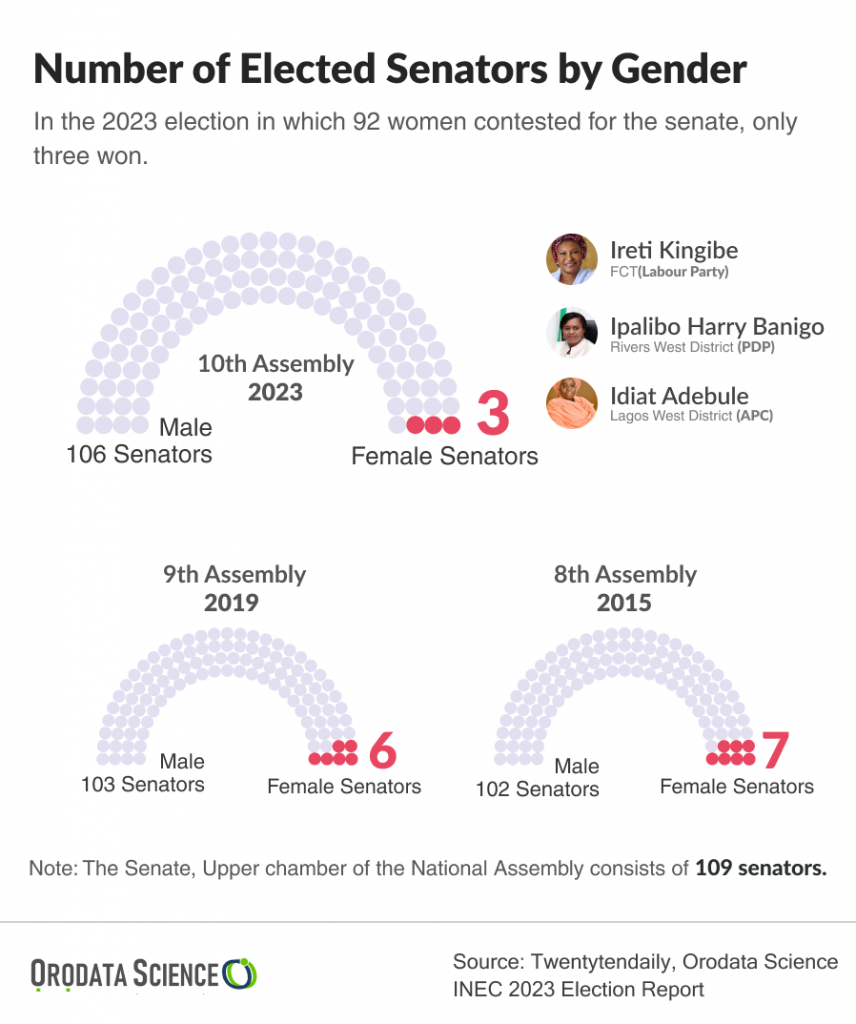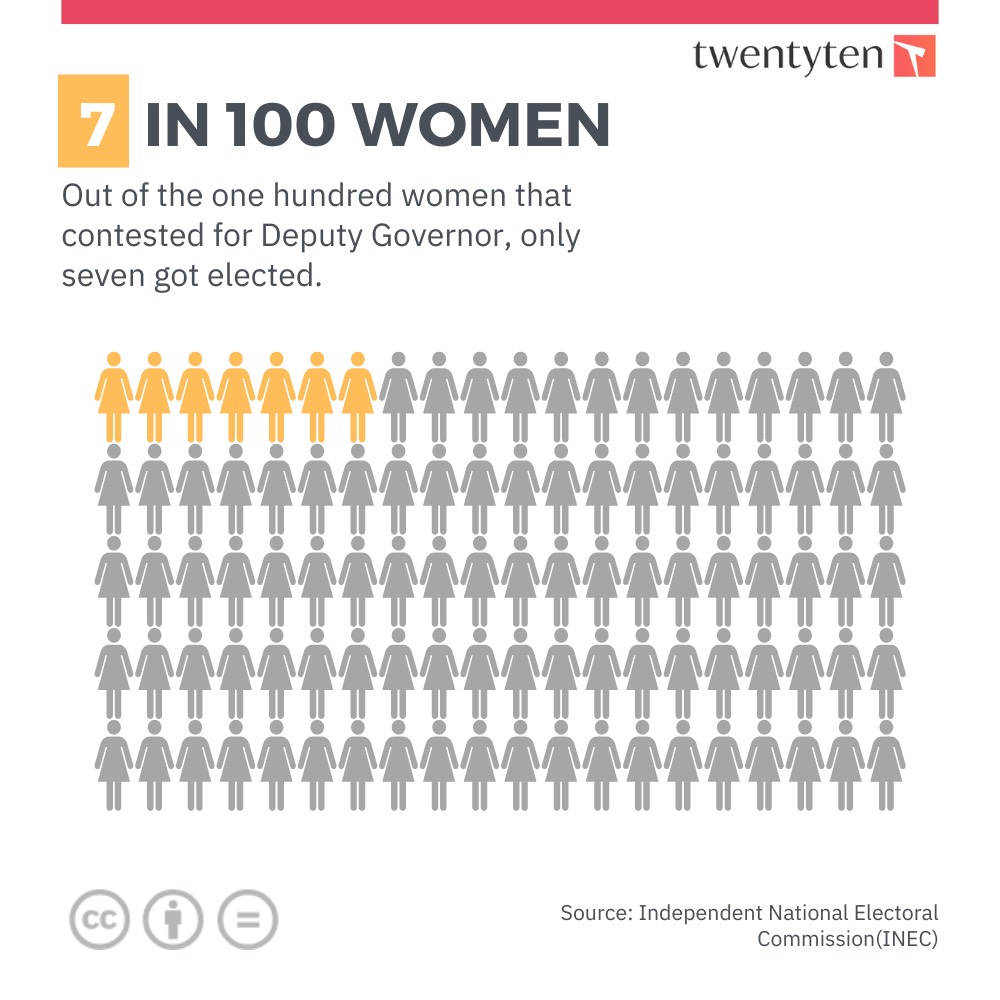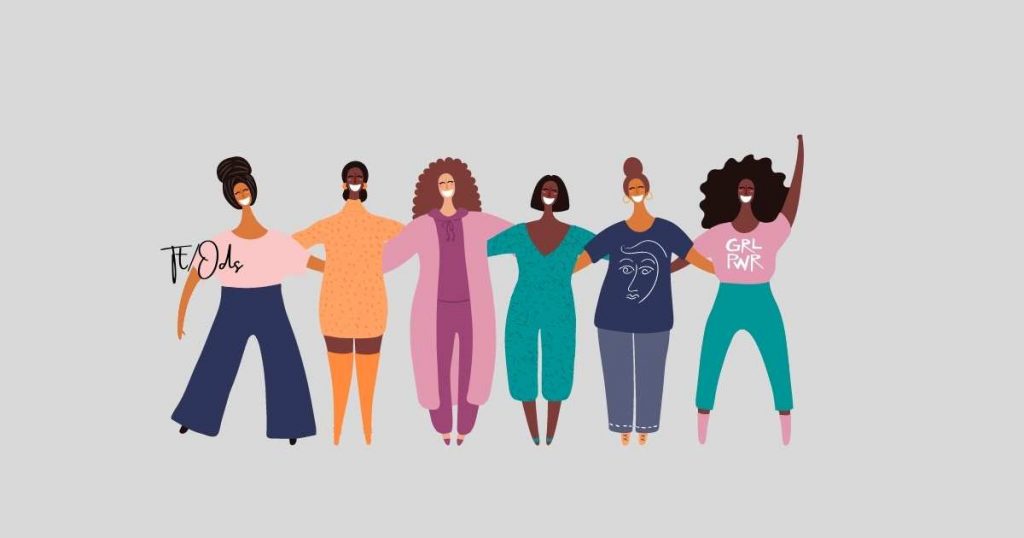As our democracy matures, Nigerian females continue to take the back seat in political participation and representation. In the just concluded 2023 general elections, female politicians performed poorly, even more poorly than in previous elections. Females make up about 49 per cent of Nigeria’s population; and according to the voter register of the 2023 general elections by the Independent National Electoral Commission, of a total of 93,469,008 people who registered to vote, 44,414,846 or 47.5 per cent were females.
Orodata highlights women’s performances in various elective positions, from state to federal levels, in the 2023 general elections.
SENATE
Data from the election results show a sharp drop in the representation of females in the list of elected federal legislators. Only three females made it to the list of elected Senators in the 2023 election; this is the lowest when compared to the last two elections. There were seven female senators in the 8th Assembly inaugurated in 2015, and six in the 9th Assembly inaugurated in 2019. After the 2023 election in which 92 women contested for senatorial seats, the only three women who won and have been inaugurated into the 10th senate are the Labour Party’s Ireti Kingibe from the FCT; Ipalibo Harry Banigo of the Peoples Democratic Party from Rivers West District; and Idiat Adebule representing the All Progressives Congress and Lagos West District.
| Total Seats | Seats won by men | Seats won by women | |
| 2015 | 109 | 102 | 7 |
| 2019 | 109 | 103 | 6 |
| 2023 | 109 | 106 | 3 |

HOUSE OF REPS
In the House of Representatives election, females claimed only 15 out of the 360 seats. This is just a little higher than in 2019 when 13 women were elected into the House. Women occupied 19 House of Reps seats between 2015 and 2019.
| Total Seats | Seats won by men | Seats won by women | |
| 2015 | 360 | 341 | 19 |
| 2019 | 360 | 347 | 13 |
| 2023 | 360 | 345 | 15 |
Nigeria ranks lowest in female representation in African national parliaments. According to Statista, females have only 3.6% representation in Nigeria’s federal parliament. Rwanda and South Africa top the chart with females making up 61% and 46% of their national parliaments respectively. Nigeria shares space with core patriarchal countries like Qatar, Iran, Vanuatu and Yemen where females constitute between 0-5% of national parliaments.
GOVERNORSHIP
Like in 2019, Nigeria also lost the chance to have the first female elected governor in 2023, as the candidate of the All Progressive Congress in Adamawa State, Aishatu Dahiru Ahmed, only came close to winning the governorship election in the state.
Federal Parliaments. Nigerian women seem to be content with being Deputy Governors; even though they are outnumbered by men in this position too. Out of a hundred women who contested the positions of deputy governors in 28 states, only seven won in the following states: Ebonyi, Plateau, Rivers, Akwa Ibom, Ogun, Kaduna, Ekiti, and Adamawa. Albeit still low, this number is higher when compared to 2015 and 2019, when six and four women were elected respectively.

Table: Gender distribution of Deputy Governors in the last three elections
| Male DGs | Female DGs | |
| 2015 | 30 | 6 |
| 2019 | 32 | 4 |
| 2023 | 28 | 7 |
STATE ASSEMBLIES
In the last election, out of 990 state houses of assembly seats across the 36 states, females won only 48 seats. This is out of about 1,046 women that contested for state legislative seats, a 4.59 percent success rate. Meanwhile, these 48 lawmakers were elected in only 21 states. The remaining 15 states did not elect one female lawmaker into their respective houses of assembly in the last election. In 2015 and 2019, the figures were 60 and 40 respectively.
| Total Seats | Seats won by men | Seats won by women | |
| 2015 | 990 | 930 | 60 |
| 2019 | 990 | 950 | 40 |
| 2023 | 990 | 942 | 48 |
In total, 1,550 women contested various elective positions in 2023, but only 72 women were successful. Women have not succeeded in reaching 10 per cent representation in government since the beginning of the current democratic run in 1999.
Women remain underrepresented in politics and governance in our country despite efforts, through protests and policy proposals, by gender advocates and Civil Society Organisations to change the narrative

